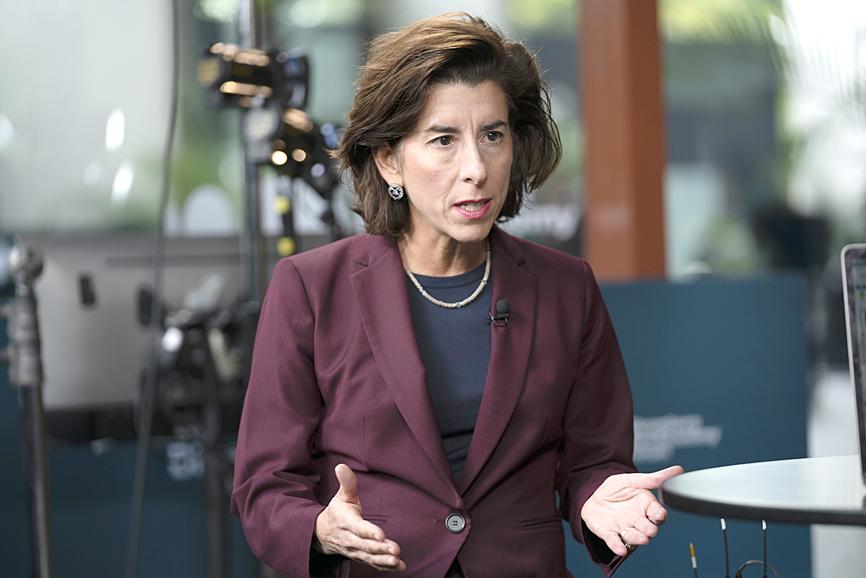The US intends to initiate a new economic framework for the Indo-Pacific next year, US Secretary of Commerce Gina Raimondo said yesterday as US President Joe Biden’s administration aims to reinvigorate its standing in the region.
“We’re likely to launch a more formal process in the beginning of next year, which will culminate in a proper economic framework” in Asia, Raimondo said at the Bloomberg New Economy Forum in Singapore. “I am here in the region beginning the discussions, laying the groundwork.”
It is clear that many people in the region want the US to rejoin the Comprehensive and Progressive Agreement for Trans-Pacific Partnership, Raimondo said, adding that “for various reasons, that is not going to happen now.”

Photo: Bloomberg
Biden has pledged to step up US engagement in Asia after years of ceding influence to China.
Yet the administration has also been accused of lacking an economic vision for the region nearly five years after former US president Donald Trump withdrew from an 11-nation Pacific trade deal.
In Tokyo earlier this week, Raimondo agreed to begin talks on resolving disputes over tariffs imposed on Japanese steel and aluminum under Trump.
That came on the heels of a similar deal with European nations.
The US and Japan also agreed to establish a Commercial and Industrial Partnership, aimed at maintaining a free and fair economic order, improving industrial competitiveness, shoring up supply chains and addressing climate change issues.
The US administration is focused on creating good jobs at home, but “we are equally focused on restrengthening our relationships with our allies — in Europe, in the Indo-Pacific and around the world,” Raimondo said at the forum. “We’re talking about onshoring, but we’re also talking about friendshoring.”
“Take semiconductors — it is a global, complex supply chain,” she said. “That won’t change and that is OK. We don’t think everything can be domestically produced, so we want to work with our allies and friendshore.”
However, along with that collaboration, the administration wants to increase the domestic supply of chips, both from US firms and also from foreign companies, she said.
One way that the US is trying to ameliorate that chip shortage was to request supply chain information from top chipmakers.
Raimondo reiterated that the data request from her department is voluntary and the US would keep information it received “strictly and completely confidential.”
“Increasing transparency will reduce the bottlenecks,” she said in an earlier appearance on Bloomberg Television.
However, Raimondo did not comment on whether the US is concerned that foreign governments might adopt similar measures and request information from US companies.
Raimondo also called on China to live up to its commitments, including in a trade deal between the two nations.
“China needs to play by the rules, they need to respect our IP [intellectual property], they need to live up to their commitments,” she said.
“Right now for example in the so-called phase 1 deal where the Chinese committed to purchasing a certain amount of aircraft and agricultural products, they’re not doing that, they’re not living up to their commitments,” Raimondo added.

The US dollar was trading at NT$29.7 at 10am today on the Taipei Foreign Exchange, as the New Taiwan dollar gained NT$1.364 from the previous close last week. The NT dollar continued to rise today, after surging 3.07 percent on Friday. After opening at NT$30.91, the NT dollar gained more than NT$1 in just 15 minutes, briefly passing the NT$30 mark. Before the US Department of the Treasury's semi-annual currency report came out, expectations that the NT dollar would keep rising were already building. The NT dollar on Friday closed at NT$31.064, up by NT$0.953 — a 3.07 percent single-day gain. Today,

‘SHORT TERM’: The local currency would likely remain strong in the near term, driven by anticipated US trade pressure, capital inflows and expectations of a US Fed rate cut The US dollar is expected to fall below NT$30 in the near term, as traders anticipate increased pressure from Washington for Taiwan to allow the New Taiwan dollar to appreciate, Cathay United Bank (國泰世華銀行) chief economist Lin Chi-chao (林啟超) said. Following a sharp drop in the greenback against the NT dollar on Friday, Lin told the Central News Agency that the local currency is likely to remain strong in the short term, driven in part by market psychology surrounding anticipated US policy pressure. On Friday, the US dollar fell NT$0.953, or 3.07 percent, closing at NT$31.064 — its lowest level since Jan.

The New Taiwan dollar and Taiwanese stocks surged on signs that trade tensions between the world’s top two economies might start easing and as US tech earnings boosted the outlook of the nation’s semiconductor exports. The NT dollar strengthened as much as 3.8 percent versus the US dollar to 30.815, the biggest intraday gain since January 2011, closing at NT$31.064. The benchmark TAIEX jumped 2.73 percent to outperform the region’s equity gauges. Outlook for global trade improved after China said it is assessing possible trade talks with the US, providing a boost for the nation’s currency and shares. As the NT dollar

The Financial Supervisory Commission (FSC) yesterday met with some of the nation’s largest insurance companies as a skyrocketing New Taiwan dollar piles pressure on their hundreds of billions of dollars in US bond investments. The commission has asked some life insurance firms, among the biggest Asian holders of US debt, to discuss how the rapidly strengthening NT dollar has impacted their operations, people familiar with the matter said. The meeting took place as the NT dollar jumped as much as 5 percent yesterday, its biggest intraday gain in more than three decades. The local currency surged as exporters rushed to